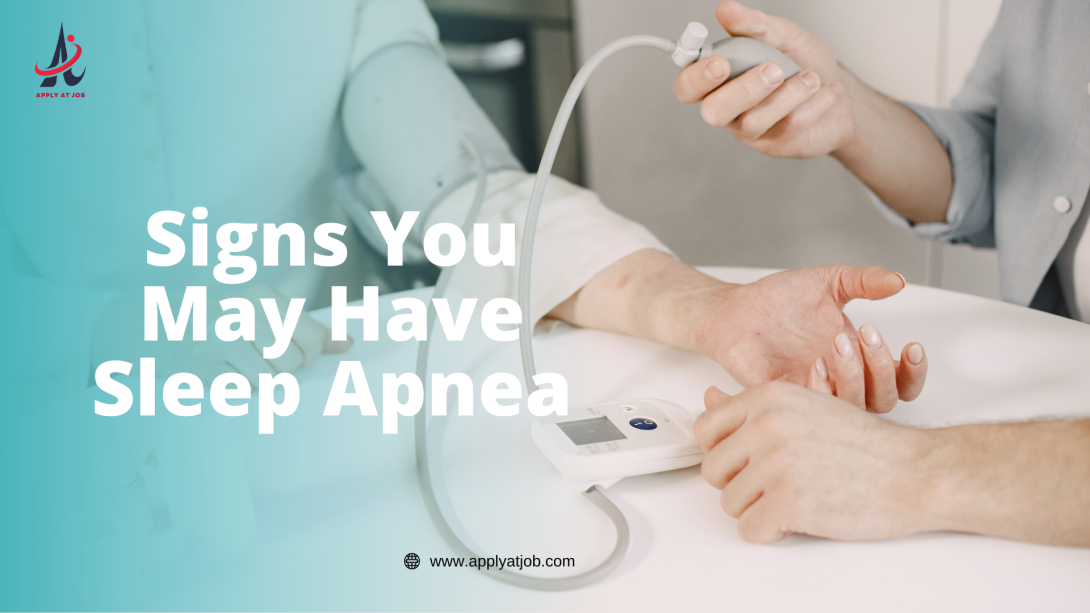
Indications of Sleep Apnea
Breathing ceases and resumes during sleep often; this is a common but dangerous sleep disease known as sleep apnea. Because so many of its symptoms happen while you're asleep, it frequently remains undetected. However, you can determine whether you may have sleep apnea by looking for certain symptoms and indicators. Since untreated sleep apnea can result in serious health issues including diabetes, heart disease, and stroke, early identification and treatment are essential. The symptoms you should look out for if you suspect you may have sleep apnea are described in this blog.
1. Continual and loud snoring
Loud snoring is one of the most typical indications of sleep apnea. While snoring by itself isn't always harmful, when combined with other symptoms, it may be cause for concern.
. Why it occurs: Air passing over your throat's relaxed tissues causes them to vibrate, which is how snoring happens. The airway becomes partially or totally obstructed in people with sleep apnea, which results in louder and more frequent snoring.
. When to worry: Snoring that is loud enough to disturb people, happens frequently, or is combined with gasping or choking noises while you sleep makes it more cause for concern.
2. Suffocating or gasping as you sleep
A further distinct symptom of sleep apnea is experiencing dysphagia or difficulty breathing upon awakening.
. Why it happens: When your airway is obstructed, your brain awakens you up for a short while to clear it. These episodes may occur frequently during the night without your complete awareness.
. When to be concerned: Consistently gasping or choking while you sleep is a reliable sign of sleep apnea and needs to be checked out by a doctor.
3. Breathing Pauses While Sleeping
One of the biggest warning signs of sleep apnea is if someone sees you pausing your breathing while you're asleep.
. Why it occurs: The most prevalent kind of sleep apnea, obstructive sleep apnea, is characterized by recurrent airway collapses or obstructions that cause brief breathing pauses during sleep.
. When to be concerned: These short bursts of time, lasting several seconds to a minute, might happen hundreds or even thousands of times every night, interfering with your oxygen and sleep cycles.
4. Daytime Sleepiness and Fatigue
If you have sleep apnea, even though you receive a full night's sleep, you may wake up feeling exhausted and be too sleepy during the day.
. Why it occurs: Your sleep cycles are disturbed by sleep apnea, which keeps you from entering the deeper, more rejuvenating sleep stages. Your body and brain don't receive the necessary sleep as a result.
. When to be concerned: If you find it difficult to remain awake during the day, nod off while engaging in activities like watching TV, or even experience fatigue while operating machinery or driving, you may have daytime drowsiness.
5. Headaches in the morning
People with sleep apnea frequently complain of headaches when they wake up.
. Why it occurs: Vascular headaches can result from blood vessels widening during sleep apnea episodes due to a drop in oxygen levels. Tension-type headaches can also be a result of sleep disturbances.
. When to be concerned: After a few length of time awake, morning headaches may disappear. They are frequently accompanied by other symptoms of sleep apnea, such as weariness or snoring.
6. Upon waking, a sore throat or dry mouth
Another symptom of sleep apnea is having a painful throat or dry mouth upon awakening, particularly if you breathe via your mouth while you sleep.
. Why it occurs: People with sleep apnea may inadvertently compensate for decreased airflow via their throats or noses by breathing through their mouths. Your mouth and throat's tissues get parched as a result, which hurts when you wake up.
. When to get concerned: It's important to look into this further if you often wake up with a sore throat or dry mouth along with additional symptoms like snoring or exhaustion during the day.
When to Consult a Physician
It's crucial to speak with a healthcare provider if you observe many of these symptoms in yourself or another person. If left untreated, sleep apnea can have major repercussions, such as an elevated risk of heart disease, diabetes, and accidents brought on by sleep deprivation. To diagnose sleep apnea, your doctor can suggest a polysomnography sleep study, in which your heart rate, oxygen saturation, and breathing patterns are tracked over the course of an overnight period.
Options for Sleep Apnea Treatment
Depending on how severe your sleep apnea is, you have a few treatment options if you are diagnosed with it:
. Continuous Positive Airway Pressure (CPAP): This device maintains your airway open while you sleep by applying consistent air pressure through a mask.
. Lifestyle Modifications: For some people, losing weight, abstaining from drinking, and sleeping on your side will lessen the severity of their sleep apnea.
. Oral Appliances: By moving the jaw forward, specially made devices worn in the mouth can assist maintain an open airway.
. Surgery: To remove extra tissue or realign sections of the airway in more severe situations, surgery could be required.
Conclusion:
Your quality of life may be greatly impacted by sleep apnea, but treatment options can be improved if you identify the symptoms early. Key signs of sleep apnea are daytime tiredness, gasping for air, and loud snoring. For an accurate diagnosis and treatment options, see a healthcare practitioner if you think you or someone you know could have sleep apnea. Resolving sleep apnea can have a significant positive impact on your general health, well-being, and quality of sleep.
You can visit our site: Applyatjob.com
https://applyatjob.com/hiring-employee
https://applyatjob.com/jobs




